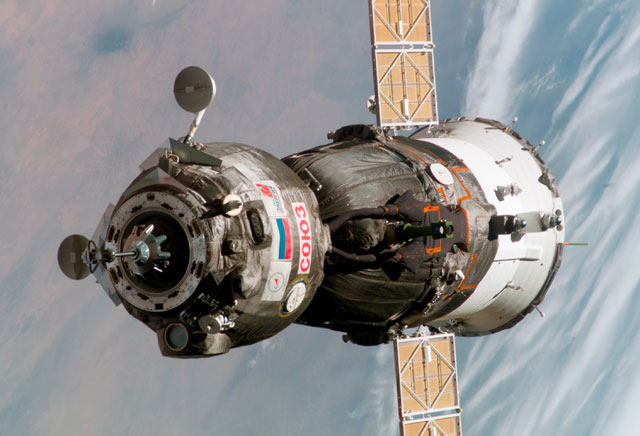Russia dominates the race in space
When the US terminates the shuttle program, Russia will fully control access to the International Space Station (ISS). It was a symbolic turning point for the long-standing trumpet between these two rivals.
>>>Space shuttle is about to launch into history
The Russian Federal Space Agency (Roscosmos) has dispelled all joy but the American astronauts will depend on Russia to fly to ISS until at least 2015 and will have to pay for it.
' We cannot say we won the race to the universe, but we have simply reached the end of a certain period ,' said Roskosmos deputy director Vitaly Davydov in an interview. problem.

Russian disposable Soyuz service vessel - Photo: AFP
On July 8, four American astronauts will fly the last flight of space shuttle Atlantis to close a three-decade program, in which the US transports supplies and crew to ISS in turn. Progress ships (cargo) and Russian Soyuz.
From now on, Washington will have to pay $ 51 million for each ticket on Russian spacecraft until a new type of ship is built by private companies.
Mr. Davydov refused all questions about rivalry between the two countries and emphasized that ISS is primarily a success story of international cooperation.
'I cannot imagine another international space project that could be effective in scale, meaning and results like ISS, ' said Davydov.
If Russia wins a symbolic victory, it is a costly victory by building more spacecraft to go back and forth on ISS to consume a budget that can be spent on other projects.
Unlike American shuttles, Russia's Soyuz can only be used once, except for the astronauts returning to the ground.
The situation is "not very convenient because it will put a burden on Roskosmos's production capacity ," space industry expert Igor Marinin told AFP.
This year, Roskosmos announced a budget of $ 3 billion, a fraction of NASA's $ 18.5 billion budget.
The agency also faced many humiliating failures, including several failed satellite launches, leading to the dismissal of Anatoly Perminov in April this year.
The Russian space industry is also mocked with a bizarre experiment that simulates a journey to Mars, in which volunteers are quarantined at a research institute in Russia for more than a year and ' landed '. 'down a specially designed sand pit.
To offset the cost, Roskosmos hopes to build a stronger position in the space trade market, such as launching satellites, according to the newly appointed leader Vladimir Popovkin at the Saint Petersburg Economic Forum. last month.
' The goal is to occupy an appropriate position in the commercial market: about 10 to 12% of the market is worth 300 billion USD per year. It is one of the few areas in which our country can compete in the international arena , 'said Popovkin.
While Russia performs 40% of the spacecraft launches and builds more than 20% of the world's spacecraft, it currently ' accounts for only a small amount of unfairness in the space trade market, not much. more than 3% ' , according to Popovkin.
Russia also faced new rivals, most notably China, which became the third country in the world, after the Soviet Union and the US, to bring people into space on a self-built ship in 2003.
In an ambitious plan, China hopes to bring a robot to the moon in 2013 and build its own space station scheduled to go into operation in 2015.

Space Shuttle commander Atlantis Robert Gibson (left) shakes hands with Commander of the Russian space station Mir, Vladimir Dezhurov, aboard Atlantis on the connection in 1995 -i
Mr. Davydov is aware that China has become a rival, although the distance is quite far.
He said: ' There is enough room for everyone in the universe. With a certain feeling, China is our competitor . but this is absolutely normal and we are not concerned about this market for a long time. '
Ironically, the commercial aspect of the Russian space program left some former astronauts from the Soviet era dreaming of the competitive atmosphere of the Cold War.
Former astronaut Georgy Grechko laments: ' It is strange that during the Cold War, when we, astronauts and engineers dreamed of cooperation, there were a lot of launches. However, then the collaboration comes and now we mostly repeat ourselves. '
According to Grechko, the goal of reducing the cost of spacecraft launches in the US shuttle program has finally not been achieved and, with its end, witnessed the return of historic ships. use once. These ships are not very different from 50 years ago.
' Humanity has lost its stimulation in flying into space with more complex machines ,' said the 80-year-old former astronaut.
- America's trump card in the space race with Russia
- Russia announced the race to build the Moon space station
- Russia is afraid to lag behind in the race to space
- Russia shows off space robots superior to the US and China
- Trump ordered the US military to dominate the galaxy
- Korolyov - the pride of the Soviet space science
- Shenzhou 10 and the space race
- Easy to 'race' up space
- Russia leads the number of launches to space
- New design warms up the space cruise ship race
- Russia plans to build nuclear spacecraft
- Dubna: Berkeley's worthy rival (2)
 Van Allen's belt and evidence that the Apollo 11 mission to the Moon was myth
Van Allen's belt and evidence that the Apollo 11 mission to the Moon was myth The levels of civilization in the universe (Kardashev scale)
The levels of civilization in the universe (Kardashev scale) Today Mars, the sun and the Earth are aligned
Today Mars, the sun and the Earth are aligned The Amazon owner announced a secret plan to build a space base for thousands of people
The Amazon owner announced a secret plan to build a space base for thousands of people